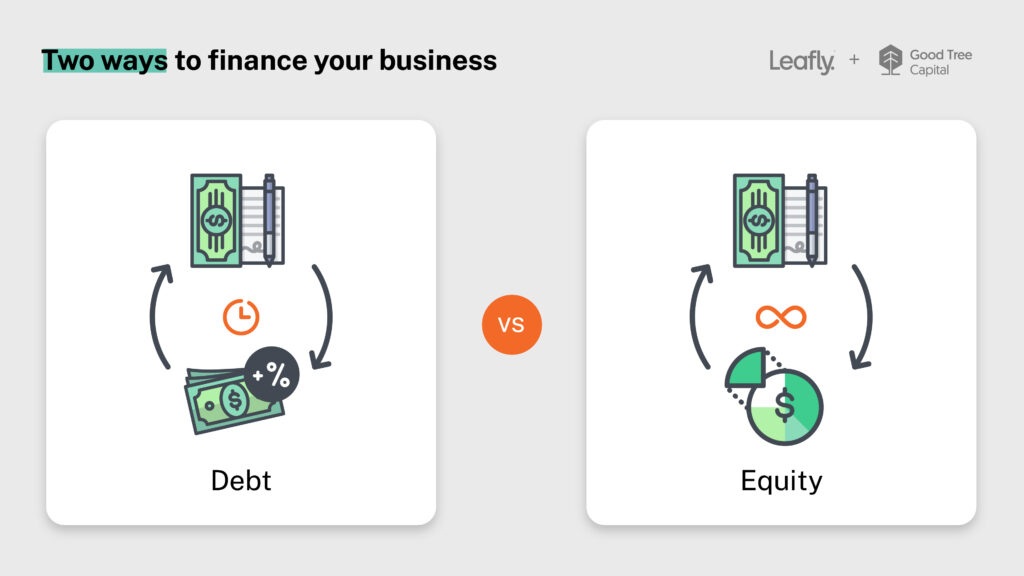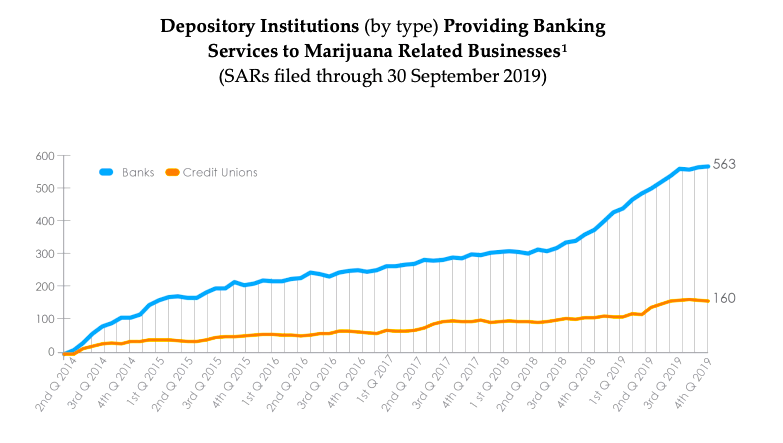[ad_1]
This article is the fifth in a series called, “So you want to start a canna biz?” created in partnership with Good Tree Capital. This article focuses on getting money to start your cannabis business.
Financing is the primary barrier to entry into the cannabis industry, so it is important to structure your approach to overcoming it as a challenge. It doesn’t matter if you’re a bodega on the corner, a chain restaurant, a cannabis cultivator, or one of the big four tech firms, there are really only three ways to finance any business’ growth:
- Reinvesting profits from running your business
- Taking out debt from a lender
- Selling an equity ownership stake in your business to an investor.
Previously, we briefly touched on each method of financing. Now, it’s time to explore more.
Profit, debt, or equity?
Before you continue reading, you should be clear on where your business stands and what you can afford to do.
- Has your business already made a profit? Companies make profits when the revenue earned from sales exceeds the cost to generate those sales.
- Or will you need to use debt? Debt typically comes in the form of credit cards or loans to the business and must be repaid.
- Your third option is equity. Equity funding does not need to be paid back. Businesses raise equity when they sell a percentage of ownership to an outside investor.
If your business is up and running, and you’re making a profit, then congratulations! You seem to have a good thing going. We’ll continue to focus on how new or existing cannabis businesses should think about raising debt or equity or both, and return to profitable businesses at the end of this article.

With the federal prohibition of cannabis, the supply of both debt and equity is severely restricted. Most banks aren’t even willing to provide cannabis licensees with bank accounts, let alone credit cards or loans to help them run their business.
Related
How much does it cost to launch a cannabis business?
The availability of equity funds is similarly restricted. Private equity investors, including venture capitalists and angel investors, are often limited by either stigma or situational, social governance policies that prohibit them from investing in cannabis.
When supply is low and demand is high, prices spike. Low risk cannabis businesses seeking loans will often pay north of 25% APR for loans that would cost comparably risky non-cannabis businesses a quarter of that amount.
How to get a canna biz loan
You can avoid predatory lending by first self-evaluating the strength of your candidacy for a loan or credit. Someone who lends you money and expects it back is looking for whether you are earning enough monthly sales to make monthly loan payments and if you have a history of consistently paying your obligations.
They will also want to see business or personal assets that can be seized to recoup the value of the loan if you fail to make your monthly payments.
The Small Business Administration provides a useful rubric for how to make the best possible case for a loan. While the SBA does not lend to cannabis businesses, the Financial Crimes Enforcement Network (FinCen) reported that 723 banks and credit unions (6% of total) across the nation provided banking services to cannabis businesses in 2019.

FinCen stopped publicly reporting which banks and credit unions filed with them, so if you are interested in learning which banks and credit unions in your State offer services to cannabis companies, then we suggest submitting a Freedom of Information Act request with FinCen to disclose the filers.
Other sources of capital for a cannabis business
Development funds
Another worthwhile source of capital is an innovative model emerging out of Illinois. Upon legalizing cannabis for adult use, the State also created a $30 million Cannabis Business Development Fund that is to be used to make low-interest loans to social equity licensees in the State.
The intention was to ensure individuals from disproportionately impacted communities would have a source of capital to jumpstart and grow their businesses, putting them on more equal footing with deep-pocketed multi-state operators. Washington, Colorado, and a number of other states are considering similar programs.
The portrait you paint for a bank lender or government agency should be the same portrait you paint for more informal lenders, such as your mother or father, former boss, business partner, or your rich uncle.
Friends and family
We encourage you to look beyond institutional financiers and engage with people who believe in your business plan. Relying on family and friends to provide you with loans is advisable (particularly at an early stage) with the upside that they fully understand and appreciate the risk of lending your business money.
In fact, a common misconception in equity financing is that the only viable investors come from multi-million dollar venture capital firms. The reality is that most businesses’ first equity investors are usually made up of supportive family members and friends.
Though a huge funding injection from an investment group is great, it is equally as impactful to receive investments from peers and like-minded individuals who believe in your idea and want to support what you are building.
Determining equity stakes
While debt investors deploy capital for an immediate return, equity investors aren’t looking for a short-term payback. The goal of an equity investor is to support your company’s growth so that their investment increases in value as your business matures.
Having an equity stake in a company is essentially owning a piece of the business, and those stakeholders are usually in it for the long haul, anticipating that their investment bolsters the success of the business.
Related
Cannabis business models 101
New business owners run the risk of both vastly overvaluing their company and vastly undervaluing their company. Overvaluing your company puts off sensible investors and ones who believe your company is too expensive. Undervaluing your company can lead to you losing majority ownership or sacrificing control of your company long-term.
Before selling anyone a piece of your company, it is critical to determine your company’s valuation. The only way to determine how much an investment is worth is to look at it in the context of the total value of the company.
Ways to determine the value of your company include:
| Method | Function |
|---|---|
| Use the sum of your expected costs to launch your business | For pre-operational companies, you can look at all the costs you will incur to become operational. Investors equity will be proportionate to the percentage of costs their capital covers. |
| Calculate the value of all assets | Add up the value of everything your business owns (license, inventory, real estate), then subtract any debts or liabilities (loans, accounts payable, taxes) |
| Use an annual sales valuation multiple | First determine your annual revenue, then use a multiple to determine how much your business model can be worth for a certain level of sales revenue. Find multiples based on looking at similar cannabis businesses sales, growth, and valuation metrics |
| Utilize your price-to-earnings ratios | Estimate your price-to-earnings ratio to determine your worth based on your projected annual earnings |
| Perform a discounted cash-flow analysis | A discounted cash-flow analysis is a future projection based on a business’s annual cash flow. To determine this, use a “net present value” calculator. |
If you successfully utilize debt and equity to finance your business, you can then unlock the third, aforementioned type of financing businesses use – profits.
The ultimate goal of all businesses is profitability, and after a couple years of stable operations, the profit your business generates can be reinvested back into the company.
Once growth and development are sustained by the cash the business generates from operations, then the business truly becomes viable and is positioned to scale and expand.
By submitting this form, you will be subscribed to news and promotional emails from Leafly and you agree to Leafly’s Terms of Service and Privacy Policy. You can unsubscribe from Leafly email messages anytime.
[ad_2]
Source link








